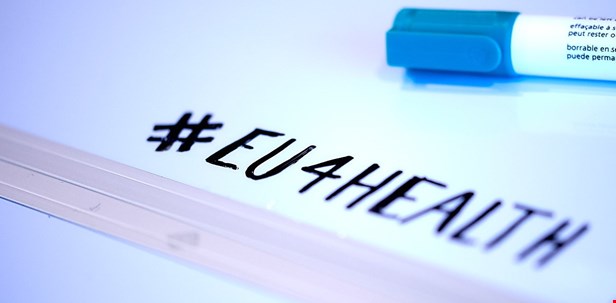#EU4HEALTH – Our vision for the next European policy and budgetary framework

Health was only mentioned in the “Doing less” option of the five scenarios of President Juncker for the future of the EU, as a possible topic where the EU could reduce its action.
Since then 13 months have passed exactly, and we, together with the public health community have used this time to reflect on the current policy framework, the upcoming trends, to launch a campaign (#EU4HEALTH).
As a response to the five scenarios we wanted to make sure to share with EU decision makers our own vision of the future of the EU where health plays a central role. Today, we present you with this vision, developed in a joint effort with a wide coalition of NGOs.
Our vision for the future EU
Together with other 14 NGOs from the public health sector we release a public statement that details our six claims at the backbone of our vision for the future of the European Union.
To ensure that this vision does not get lost, we call for strong leadership on health, including a stand-alone Directorate General that will ensure that health protection and promotion is guaranteed across all European Commission portfolios.
We also call for an EU level framework to tackle non-communicable diseases (NCDs). Indeed, 70 to 80 percent of healthcare budgets are spent on NCDs. This corresponds to €700 billion per annum in the European Union, and the figures are projected to rise in the coming years.
Although – or precisely because! – health competence is a shared competence between the European Union and its Members States, the EU health policy should support national health systems with expertise and evidence. The EU should play a key role in monitoring and benchmarking of health systems in Member States. It should drive ambitious yet achievable goals, set milestones and reduce health inequalities in Europe.
With this vision paper, we offer EU decision-makers positive, constructive arguments towards a health-friendly EU policy. An EU policy that responds to the expectations of EU citizens and patients, and therefore contributes to fight Euroskepticism. In a way, an EU policy that respects the 70% of European citizens that expressed themselves in favour of more EU action on health (Eurobarometer November 2017).
Next steps
As patients, we can’t be satisfied with mere compensations to the externalities created by the single market. Over the weekend, the 72 EPF members have sent powerful messages to the EU leadership on the occasion of the EPF Annual General meeting. We want an ambitious health policy for the EU.

In the next weeks, we will keep making our voice heard. The European Commission intends to present its proposals for the next Multiannual Financial Framework, which will de facto determine the priority policy framework, on 2 May 2018. The patient community will be watching!
Milestones
- June 2017 – EPF and EPHA Presidents send a letter to President Juncker raising concerns over the possible discontinuation of health collaboration at EU level.
- July 2017 – the Patient Access Partnership and the MEP interest Group on Access to care discuss the added value of EU involvement in the area of health.
- December 2017 –EPF Breakfast Briefing on the #EU4HEALTH Campaign
- March 2018 – the European Parliament adopts its own-initiative report on the next Multi-Annual Financial Framework. The Parliament’s resolution “recognises the European added value of collaboration in addressing common public health threats; notes that no single Member State can tackle cross-border health challenges alone”
- April 2018 – EPF and the European Public Health Alliance (EPHA) release a joint statement calling for a Vice-President for Health
